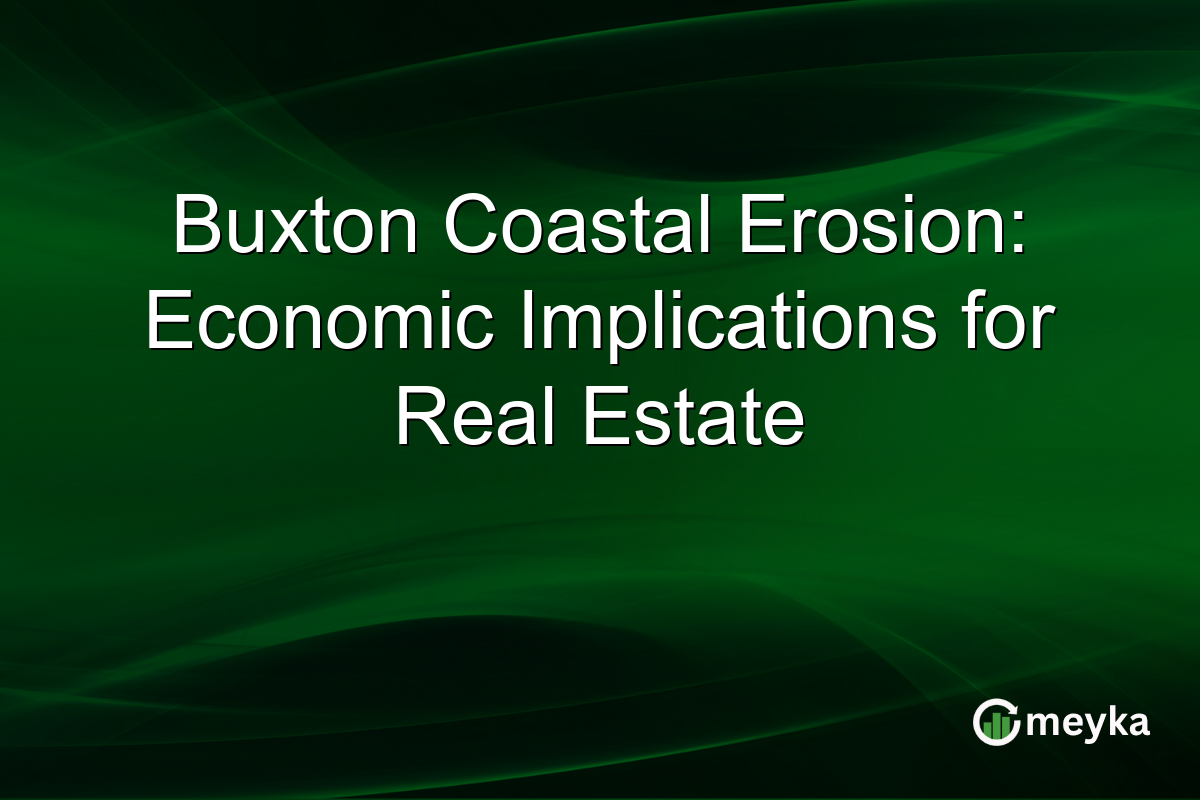Buxton Coastal Erosion: Economic Implications for Real Estate
Buxton, a region renowned for its coastal beauty, faces a serious threat from ongoing erosion. The recent collapse of a dozen homes this past month has ignited concerns about the property’s future stability. The sweeping changes from climate change effects are deeply impacting the real estate market, with investors and homeowners anxious about property value impact and the looming risk of a real estate collapse. This article delves into these issues, offering insights into the economic implications of Buxton’s coastal predicament.
The Severity of Coastal Erosion in Buxton
Coastal erosion in Buxton has reached alarming levels. Recently, two more homes fell prey to the relentless sea, bringing the total to twelve homes lost in just a month, as reported by Outer Banks Voice. This growing pattern underscores the vulnerability of the region to natural forces driven by climate change effects. Due to such environmental changes, the coastline’s receding boundary not only threatens existing structures but also dwindles available land for future development. This scenario poses a severe risk to community planning and property-based investments in the area.
Impact on Property Values
The relentless impact of erosion cast a shadow on property values in Buxton. As the shoreline continues to inch closer to residential areas, the perceived risk devalues surrounding properties. Homeowners face stark realities, grappling with decreasing equity and challenging resale conditions. Real estate analysts suggest a potential decline in property value impact by as much as 30% in some areas severely affected by erosion. This significant downturn is compounded by broader fears of a real estate collapse, making investment in such regions increasingly unattractive.
Legal and Regulatory Responses
In response to the escalating crisis, local governments and regulatory bodies are adopting stringent measures. New zoning laws now restrict construction in high-risk zones, and existing property owners may face mandatory relocation. These legal changes aim to safeguard against further economic loss while ensuring the community’s safety. Nevertheless, such measures are double-edged—it protects property interests yet simultaneously limits development opportunities. As lawmakers continue to weigh options, the real estate market remains caught in a complex balance of economics and environmental stewardship.
Economic Forecast and Market Sentiment
The economic outlook for Buxton’s real estate market is tenuous amid these developments. Investors are wary, assessing the long-term viabilities relative to ongoing and future erosion parameters. While some see opportunity in redevelopment and sustainable building innovation, others retreat in favor of more stable coastal investments. Market sentiment echoes caution; the shadows of climate change effects loom large, and economic stability remains tethered to aggressive environmental management solutions. For a detailed account of recent events, see Outer Banks Voice.
Final Thoughts
Buxton’s ongoing coastal erosion paints a challenging picture for real estate stakeholders. The immediate impacts—home collapses and declining property values—highlight urgent needs for adaptive strategies. Looking ahead, the region must grapple with balancing development and preservation, requiring innovative environmental management approaches. For investors, the choice lies in high-risk/high-reward scenarios or retreating to safer terrains. Ultimately, understanding and integrating climate resilience into real estate planning is crucial for sustaining economic growth in vulnerable coastal regions.
FAQs
Coastal erosion significantly impacts property values by increasing the perceived risk, leading to a reduction in demand. Properties closer to eroding shorelines face drastic value declines, possibly up to 30%, as concerns over safety and future viability deter potential buyers.
Authorities have implemented zoning restrictions to prevent new construction in high-risk areas and are considering relocation initiatives for vulnerable properties. These measures aim to protect residents and preserve the remaining coastal infrastructure, though they may limit future development.
Long-term implications include potential devaluation risks and restricted development opportunities. Investors may face challenges in resale and reduced rental income prospects. However, some may see opportunities in innovative redevelopment solutions or sustainable coastal projects.
Disclaimer:
This is for information only, not financial advice. Always do your research.






